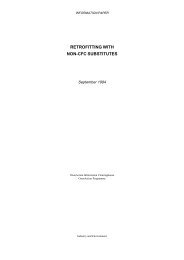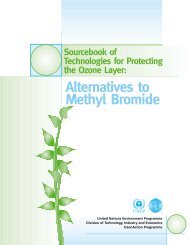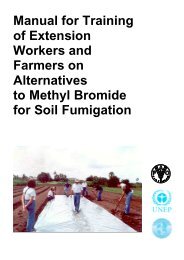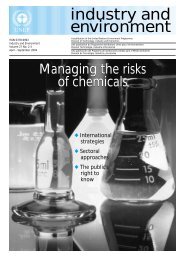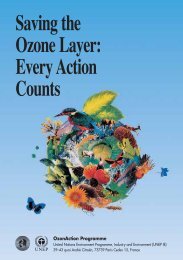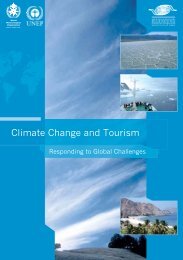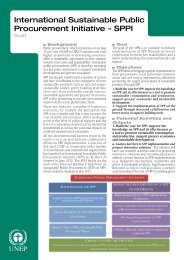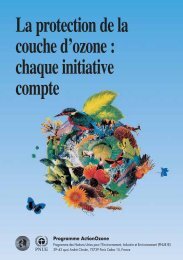Mining and Sustainable Development II - DTIE
Mining and Sustainable Development II - DTIE
Mining and Sustainable Development II - DTIE
You also want an ePaper? Increase the reach of your titles
YUMPU automatically turns print PDFs into web optimized ePapers that Google loves.
E d i t o r i a l<br />
Editorial<br />
<strong>Mining</strong> <strong>and</strong> sustainable development: challenges for the<br />
next decade<br />
Activities related to mining <strong>and</strong> sustainable development have<br />
been an important part of UNEP’s work for a number of years.<br />
This is, in fact, the second issue of Industry <strong>and</strong> Environment<br />
devoted to the subject. The environmental effects of the mining<br />
industry include destruction of natural habitats, changes in river<br />
regimes <strong>and</strong> water tables, <strong>and</strong> other serious ecological impacts.<br />
Although the industry has succeeded in making improvements,<br />
serious problems remain, beginning with the need to reduce the<br />
number <strong>and</strong> severity of accidents.<br />
The January 30 mine tailings accident in Baia Mare, Romania,<br />
resulted in a cyanide plume that crossed four countries entering<br />
the Danube. UNEP <strong>and</strong> the UN Office for the Coordination of<br />
Humanitarian Affairs (OCHA) led an assessment mission to the<br />
region <strong>and</strong> their final report has helped focus several of UNEP’s<br />
mining related initiatives this year. In China, too, 23 mining<br />
related accidents have been reported this year including five<br />
tailings dam failures.<br />
As part of its work on improving environmental performance,<br />
UNEP has undertaken several critically important initiatives with<br />
various partners. Due to problems associated with cyanide use, it<br />
initiated the development of an industry cyanide code for its use<br />
in gold mining with the International Council on Metals <strong>and</strong> the<br />
Environment. This code should be adopted in 2001. An APELL for<br />
<strong>Mining</strong> h<strong>and</strong>book, aimed at reducing the risk of accidents <strong>and</strong><br />
developing local emergency preparedness should an accident<br />
occur, will be available in early 2001. With the International<br />
Commission on Large Dams, UNEP has stressed the importance of<br />
introducing contingency measures to ameliorate the impact of<br />
tailings dam incidents at the design stage. With the government<br />
of Australia, UNEP recently hosted an international workshop (in<br />
which some 20 countries participated) to promote more effective<br />
regulation of mining’s potentially hazardous aspects. Moreover,<br />
since mining companies are heavily capitalized, UNEP is<br />
encouraging financial institutions including the World Bank Group<br />
to play a greater role in fostering sustainable mineral<br />
development. As one important tool for making information freely<br />
available, UNEP uses the Environment section of the Mineral<br />
Resources Forum website initiated by the United Nations<br />
Conference on Trade <strong>and</strong> <strong>Development</strong> (UNCTAD).<br />
Availability of water is likely to be one of the 21st century’s most<br />
pressing resource issues. All but a h<strong>and</strong>ful of countries in which<br />
mining takes place (e.g. Canada, Norway <strong>and</strong> Sweden) are<br />
vulnerable to water scarcity. Growing populations, <strong>and</strong> other<br />
industries, compete with the mining industry for a share of this<br />
resource. UNEP has been working with the International Council<br />
on Metals <strong>and</strong> the Environment on a best practice case study<br />
book concerning water management at mining sites.<br />
UNEP is also addressing other mining related issues, including<br />
energy dem<strong>and</strong>, ab<strong>and</strong>oned sites, biodiversity <strong>and</strong> protected<br />
areas <strong>and</strong> the use of hazardous chemicals. Under the rubric of<br />
cleaner production, UNEP’s broad objective is to phase out the<br />
production <strong>and</strong> use of persistent <strong>and</strong> bioaccumulative substances,<br />
including heavy metals, which affect human health <strong>and</strong> the<br />
environment.<br />
UNEP is dedicated to helping the mining industry achieve its<br />
ambitious environmental <strong>and</strong> social targets. To succeed, we<br />
believe a policy mix including regulatory measures, economic<br />
incentives <strong>and</strong> voluntary initiatives will be necessary. The Malmö<br />
Declaration of the first Global Ministerial Environment Forum,<br />
convened by UNEP in May 2000, stated that: “The private sector<br />
has emerged as a global actor that has a significant impact on<br />
environmental trends through its investment <strong>and</strong> technology<br />
decisions. In this regard, Governments have a crucial role in<br />
creating an enabling environment. The institutional <strong>and</strong><br />
regulatory capacities of Governments to interact with the private<br />
sector should be pursued to engender a new culture of<br />
environmental accountability through the application of the<br />
polluter-pays principle, environmental performance indicators<br />
<strong>and</strong> reporting, <strong>and</strong> the establishment of a precautionary approach<br />
in investment <strong>and</strong> technology decisions.”<br />
Early in 2000, the Global <strong>Mining</strong> Initiative (GMI) was launched<br />
by over 25 CEOs of the world’s largest mining companies to<br />
examine the range of current issues <strong>and</strong> ensure that the industry<br />
<strong>and</strong> other stakeholders will work together to contribute to<br />
sustainable economic development patterns. GMI initiated the<br />
<strong>Mining</strong> Minerals <strong>Sustainable</strong> <strong>Development</strong> (MMSD) project as an<br />
independent process of multi-stakeholder engagement <strong>and</strong><br />
analysis, with the objective of “identifying how mining <strong>and</strong><br />
minerals can best contribute to the global transition to sustainable<br />
development.” As Kofi Annan, the UN Secretary General, has said:<br />
“Transnational companies have been the first to benefit from<br />
globalization. They must take their share of the responsibility for<br />
coping with its effects.”<br />
That such accountability <strong>and</strong> transparency go together with<br />
environmental reporting has been consistently advocated by<br />
UNEP. It is one of the co-convenors of the Global Reporting<br />
Initiative (GRI), along with the Coalition for Environmental<br />
Responsible Economies (CERES) <strong>and</strong> with the support of the<br />
United Nations Foundation. GRI is a long-term, multi-stakeholder<br />
international undertaking to develop globally applicable<br />
sustainability reporting. Its objective is to raise sustainability<br />
reporting to the same level of acceptance <strong>and</strong> consistency as<br />
financial reporting.<br />
In the lead-up to Rio+10 in 2002, UNEP is reviewing the mining<br />
industry’s environmental performance <strong>and</strong> management systems,<br />
as well as the use of voluntary agreements to complement<br />
government regulatory initiatives.<br />
The mining industry faces many challenges in the coming years.<br />
This issue of Industry <strong>and</strong> Environment presents the viewpoints of<br />
different stakeholders, thus helping to define both challenges <strong>and</strong><br />
possible solutions. The mining industry’s commitment to<br />
sustainable mineral development needs to continue to evolve, in<br />
order to meet these challenges effectively.<br />
◆<br />
UNEP Industry <strong>and</strong> Environment – Special issue 2000 ◆ 3



